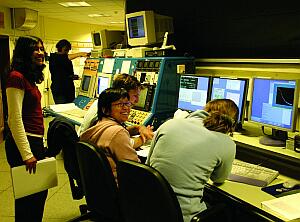 | |||
|
| Home > Public Information > ING Newsletter > No. 9, March 2005 > WINT: Observing Time Awarded to High School Students from The Netherlands |
|
|
SCIENCE |
|
|
|
Previous: News from the Roque | Up: Table of Contents | Next: Visits to ING
 | |||
|
| Home > Public Information > ING Newsletter > No. 9, March 2005 > WINT: Observing Time Awarded to High School Students from The Netherlands |
|
|
SCIENCE |
|
|
|

|

|
| Students at the INT control room during WINT observations. [ JPEG1 | TIFF1 ] [ JPEG2 | TIFF2 ]. | |
| Top | Back |
|